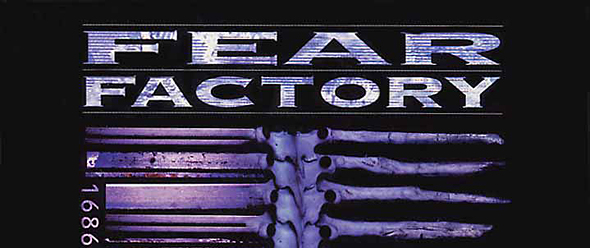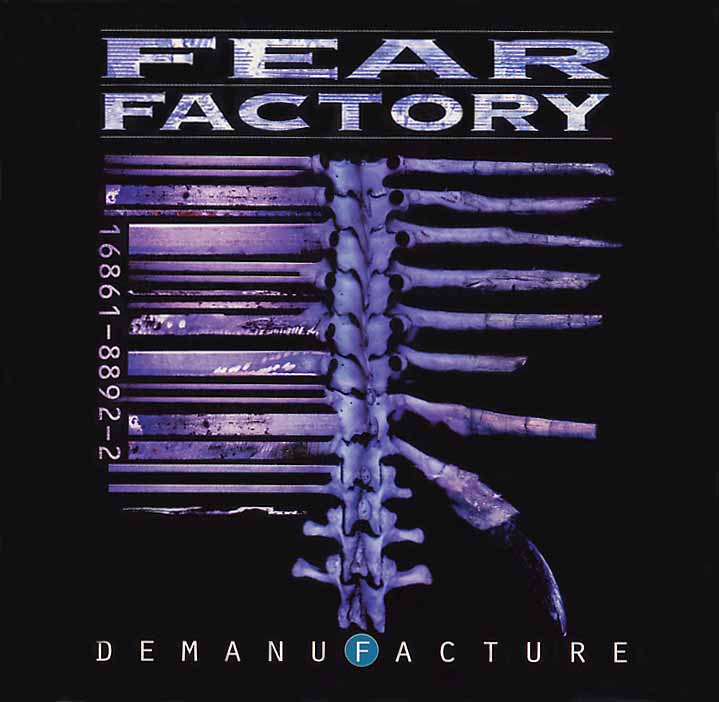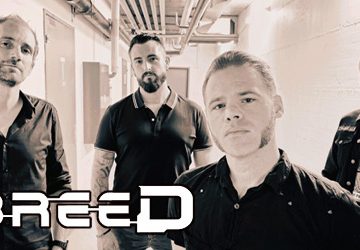Sometimes an album gets released and does very well, shifts a lot of copies, and winds up as a feather in that band’s particular cap for years to come. Other times, the album winds up encapsulating an era, heralds a trend, or sets a tone for the future of that genre; hell, sometimes an album can launch a genre by itself. Once in a great while, a band decamps to a studio, lays down their tracks, and walks out with something so special, so cutting edge, that no one in and around the creative process even realizes what they just accomplished. Fear Factory emerged from the sultry sprawl of Los Angeles in 1989, playing a brand of brutal Death Metal while also displaying a creative penchant for industrial and noise elements.
The aforementioned elements helped them set a mood in their music that was absent from the repertoires of most of their contemporaries. They even released an EP of bold Industrial remixes, dropping it quietly into the very lap of upheaval that was taking place in Heavy Metal at the time. As the ’90s ripened, Grunge, Hardcore, Punk, Industrial, and Black Metal were clamoring to occupy the commercial hole left behind by the diminishing returns of Thrash, traditional Heavy Metal, and Death Metal. In short, it was a strange time for extreme music. In the midst of it all, Fear Factory launched their second full-length studio album Demanufacture on June 13th, 1995, into one of the most uncertain climates in Heavy Metal history.
On the one hand, listeners had Pantera, Sepultura, and Machine Head heralding a more muscular, Hardcore influenced take on American Metal, while White Zombie and Korn were just beginning to add electronic, groove-laden elements to the genre’s rigid template. Even Slayer was experimenting, while Testament took a decided turn for an almost Hardcore, brutal sound as well. Such was the climate in which Demanufacture hit the streets, and the record absolutely sizzled. Never before had the brutality of Extreme Metal been so synthesized to the keys and samples of Industrial music, without sacrificing the strength of either bastion of musical expression.
The opening title track’s clanking door, noisy sound arcs, amid the rat-tat-tat double bass drumming of Raymond Herrera give way to the staccato riffing of Dino Cazares, while Burton C. Bell turns in a performance for the ages. His ability to mix a tuneful clean vocal with his harsh, intelligible Hardcore styled growl was the pinnacle of this type of vocal arrangement. Often imitated, never equaled, it added a dimension to Demanufacture that helped elevate it even further. Even “Self-Bias Resistor,” with its clinical Death Metal approach, a song that stands as a Hardcore meets Death Metal masterpiece, benefited from a hyper fast, boldly placed, clean sung chorus dropped right into the midst of the madness. The transference of moods in the song gave it this catchy dimension, with Bell’s confident voice driving it home with expert adroitness. So “in the zone” was Fear Factory when they wrote this album, even the breakdown in the middle of the song fits wonderfully. A haunting finish of almost Goth-tinged vocalization with just enough under-layering of samples brings this monster to a close.
Songs like “Zero Signal,” which famously became included in the 1995 film Mortal Kombat, transcend what the band might have even thought itself capable of; engineered for maximum tension, the intro so perfectly brought to mind the battleground of a future dystopia. Perfectly deployed samples and mechanical noises once again herald the song to come. Again Fear Factory balances the Hardcore verse /clean sung chorus approach to marvelous effect. The ultra clinical buzz of Christian Olde Wolbers’ bass guitar kept the Industrial feel intact, marrying it to the pre-1990 tempest of Napalm Death and Extreme Noise Terror. The song features one of the coolest keyboard/sample solo runs ever caught on tape, and concludes one of the most amazing opening trios of songs to grace a Heavy Metal album to date. When the slow piano chords conclude the song, one feels like the album could have ended right there and still have been a success.
On “Replica” Fear Factory populates the mid-section of the album with more staccato riffing from Cazares, a style that would eventually come to be far too relied upon by the stout guitarist. In 1995 though, the riffing style was in its early stages of development, and combined with Bell’s burning-hot vocal trade-offs, elevated songs that could have easily become run of the mill Hardcore Metal and kept the bar on Demanufacture set high. “New Breed” takes Industrial Metal to new heights, highly effective samples along with a pounding beat, and intertwines them into a high energy milkshake of throbbing devastation.
Cover songs are often poorly wrought throw-ins, but with “Dog Day Sunrise” Fear Factory truly makes another band’s song their own. A much more cerebral listen, the song features a hypnotic drum beat and a calming host of riffs piloted by Bell’s robust vocal approach. Catchy, and a respite from the battery going on around it, “Dog Day Sunrise” remains one of the more enjoyable listens one will find.
“Body Hammer” brings the dial back up to maximum heaviness. A meaty opening riff is supported by electronic pulses and that industrial clanking sound Fear Factory used so effectively. Songs like this felt so different from what was mostly available at the time, far ahead of their time and helping to shape an entirely new art form within Heavy Metal.
If there was any step back in absolute quality on Demanufacture, one could point to the song “Flashpoint.” Again, when dealing with such a high caliber monster of an album, it is almost like splitting hairs. “Flashpoint,” a quicker burst at 2:53, may not have had the sweet flow of the other songs, but it resonated with the Grindcore and Death Metal roots that Fear Factory came from. Wolbers’ bass again cuts like the saw blades of grindcore’s youth, bringing old Carcass, Repulsion, and Napalm Death to mind. Bell’s clean vocal’s still make an appearance, but without nearly the same effect as in some of the other tracks.
It is worthy to note that this album marked a departure from Fear Factory’s working relationship with Colin Richardson, a man behind the knobs of some of the finest Death Metal going at the turn of the ’90s. Instead the band chose to bring the electronic elements to the fore – something Richardson was loathe to do – at the behest of high level producer Rhys Fulber of Frontline Assembly fame. The marriage to Fulber is one of the defining elements that shot Demanufacture into the stratosphere. Take “H-K Hunter Killer,” perhaps the absolute pinnacle of the style Fear Factory was bringing to bear in the mid-’90s. “I’ve become what they detest, a delinquent survivalist, without fear and no regrets, they fucking say, I….am…a…criminal.” The sheer balls of this song, with every element in perfect synthesis, from the Industrial noises, samples from grainy police footage and press conferences, encapsulates the gangland chaos from which this band emerged. Hard charging in places, blasting in others, “H-K Hunter Killer” defined what Industrial and Metal could do together if properly connected. With Fear Factory and Rhys Fulber, it was like peanut butter and chocolate for the ears.
Where “H-K Hunter Killer” blew the doors down, the penultimate opus of “Pisschrist” slew in a subtler, but no less lethal fashion. Another in an album chock full of stunning intros, there really is no other way to say it but Fear Factory was completely in the zone when they wrote these songs. “Pisschrist” is quite possibly the best Bell has ever sounded, with the possible exception coming off of 1998’s Obsolete album on the song “Resurrection.” “Pisschrist,” on the other hand, brought back the clanging Industrial hammer, augmenting Bell’s snarl before seeing him sing out clean and clear. The tragedy of Jesus Christ and the world that ignores his message is so beautifully spoken, so powerfully articulated, that it closes out the song in magnificent, repetitive, and hypnotic fashion.
Demanufacture could have, and dare it be said, should have ended here. “A Therapy For Pain” is a long ambient piece that while built on a fairly solid foundation falls short in its attempt to be the tragic epic. Suffering from a repetitive line that loses its efficacy almost immediately, it was perhaps something Fear Factory was not quite ready to perform. They got this form right on 1998’s Obsolete, however, with the gorgeous “Timelessness,” and it would have benefited them greatly to have cut “A Therapy For Pain” down to about four or five minutes.
Nitpicking aside, Demanufacture was an absolute game-changer, and the utmost defining moment of Fear Factory’s long career. Having had ups and downs following its release, the fact is they have never even come close to eclipsing its grandeur. Obsolete was excellent, and there have been moments here and there where the feeling on Demanufacture is conjured, but overall, this 1995 album stands alone. Not only for the band to whom it is credited, but in American Metal in particular, Demanufacture stands as a moment in time that other bands shot for and missed by a wide margin. Sometimes that is just how it is, and it really is nothing to be ashamed of. For most artists, regardless of their form, there is only one Sistine Chapel up their sleeves. For Fear Factory, they found a formula and absolutely perfected it – nailed it to the wall, in fact – and there are not many bands who can make that claim. Twenty years later, Demanufacture is every bit as dangerous and cutting edge as it was the day it came out.
- Roadrunner








No comment